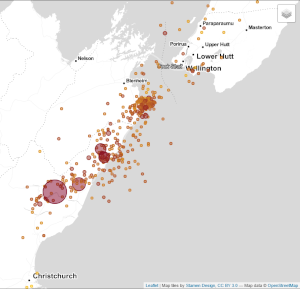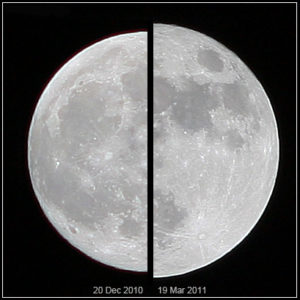Originally, I had planned an entirely different blog post for this week, something that had nothing to do with science, but sometimes life can change at the drop of a hat.
On November 14, 2016 at 12:02 am (New Zealand Time), an 7.5-magnitude earthquake struck 15 km north-east of Culverden. The coastal town of Kaikoura has been devastated, effectively cut off from any help, but they are not alone. The entire country felt this.

The first quake, a 7.5, struck just out of Culverden. Within the first 24 hours there were additional 3 quakes that were of 6.0 magnitude or greater. The township of Kaikoura has been cut off.
On my social media feeds the morning after, there was an insane number of messages of well wishes. (Thank you big time for those, guys! You have no idea how much they meant to me.) But there was also a score of messages about how the quake was the result of the super moon. My mind just struggles to come up with a nice way of putting my thoughts about this one.
So let's get to the real situation and the nitty-gritty of this misconception.
Earthquakes happen because the crust of the Earth is constantly moving.
The surface of the Earth is a rocky mass that is floating on a liquid magma core. If it moved around as a single body, we probably wouldn't have the issues with earthquakes that we do. However, the Earth's crust moves in sheets — the tectonic plates. Each plate will move at a slightly different rate and direction. As such, the plates rub against each other, creating friction. Eventually, the induced stress between the plates grows to a level where something has to give.
Bang... You have an earthquake.
Now some have suggested that the quakes currently in New Zealand are a result of the super moon. Before I get too carried away, I should probably explain what a super moon actually is.
The moon's orbit around the Earth is not entirely circular, rather elliptical. When the moon is at its farthest distance from the Earth, it's known as the apogee. The perigee is when the moon is closest to Earth. The super moon occurs when the full moon coincides with the perigee. A super moon can be up to 14% larger than the apogee moon, and 30% brighter. I should also point out that while super moons are rare, the last one being in 1948 and the next one won't be until 2034, we do have a perigee moon and an apogee moon once a month (just like we have a full moon and a new moon every month).

The super moon of March 19, 2011 (right), compared to a more average moon of December 20, 2010 (left), as viewed from Earth (Source: Wikipedia)
Now for where some of the crazy comes from regarding the super moon causing the quakes.
It is a known fact that the moon influences tidal movements. As the moon moves around Earth, its gravitational pull will create the high and low tides. The tidal influences are slightly greater during full and new moons, simply because of the Earth/Moon alignment with respect to the Sun. The influences are greater still when the moon is at perigee. Basically, because of the gravitational forces acting on the Earth during a perigee full moon (i.e. a super moon), coastal areas can expect flooding that results from king tides.
But can the super moon cause an earthquake? One simple answer: no.
Let me clarify... The moon does have some minor gravitational pull on the land, not just the oceans, causing what scientists call land wave in landlocked areas. However, this gravitational influence that the moon has on land is nowhere near strong enough to cause an earthquake on its own. Other factors must also come into play, such as tectonic activity within a region.
New Zealand is part of the Ring of Fire and has active volcanoes throughout the country, although most of them are in the North Island. Not only that, the South Island sits right on the joining edge of the Indo-Australian and the Pacific Tectonic Plates. The Southern Alpine Fault, where the two plates meet, is spectacularly marked out by the western edge of the Southern Alps snowline (see image below). You can even see where the Alpine Fault curves around at the top of the South Island. Honestly, armed with this information, is it really any wonder that New Zealand is plagued with earthquakes? However, what has made this recent string of earthquakes so fascinating from a scientific perspective is that the aftershocks are following a trail that leads along the Kaikoura Fault along the eastern coastline. (Refer to the first image in this post.)

The Alpine Fault is spectacularly marked out on satellite images by the western edge of the Southern Alps snowline. ©NASA
It has been suggested that the magnitude of a quake can be amplified if it were to occur during a super moon — that I can believe — but there is no way that the super moon was the cause of the quakes that currently plague New Zealand. If that was the case, then the entire world would be suffering from quakes of the magnitude of 6 or greater right now, not just New Zealand.
Sorry guys, but this is one misconception that results from someone having just a little understanding of science and blowing the entire situation out of proportion. Meanwhile, my own brain is completely fried by the constant rocking 'n rolling.
As part of my mental coping mechanisms, forcing me actually formulate a coherent thought, I recorded a special live show of Conversations in Science. In that show, I spoke about earthquakes and what it was really like and the challenges we faced. (I will admit that I probably rambled a bit, but my producer Jessie Sanders kept me on topic. I'm calling my current state quake brain.)
As part of the show, I briefly spoke about what you really need in your natural disaster (earthquake) survival kit. While many might argue differently, if you have a fully stocked pantry (canned goods and other non-perishable items), you'll get through. The one thing that you may need to add to your pantry that you wouldn't think to include is water. You need at least 2 litres of water (1/2 gallon) per person per day for a minimum of three days, even if you live in a city. If you live in the country, you'll need more than that. It can easily take up to three days for Civil Defence agencies to mobilise and get water to the affected areas. You need to be able to survive until then.
And storing that emergency kit in your garage... Reality check... In a quake, you might not be able to get to it if you need to. Keep what you really need in your house.
There were other tips mentioned too — all things that I've learnt through experience. (I've lived with major earthquakes for over six years now.)
To listen to the special episode on earthquakes, you can find the links below.
Earthquakes, did mother nature just fart?
(First aired live on November 14, 2016)
Share this:
- Click to share on Facebook (Opens in new window) Facebook
- Click to share on X (Opens in new window) X
- Click to share on Pinterest (Opens in new window) Pinterest
- Click to share on LinkedIn (Opens in new window) LinkedIn
- Click to share on WhatsApp (Opens in new window) WhatsApp
- Click to share on Mastodon (Opens in new window) Mastodon
- Click to email a link to a friend (Opens in new window) Email
- Click to print (Opens in new window) Print

Fascinating post. I enjoyed reading it. My prayers are with those affected.